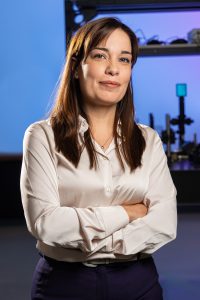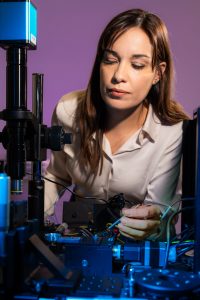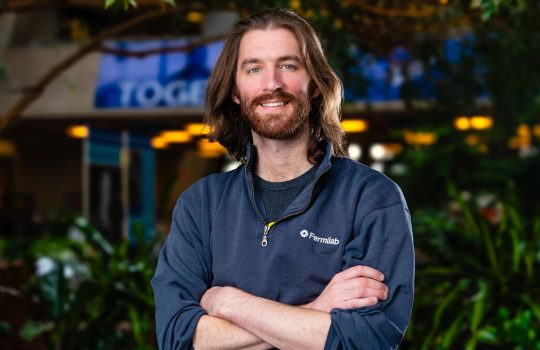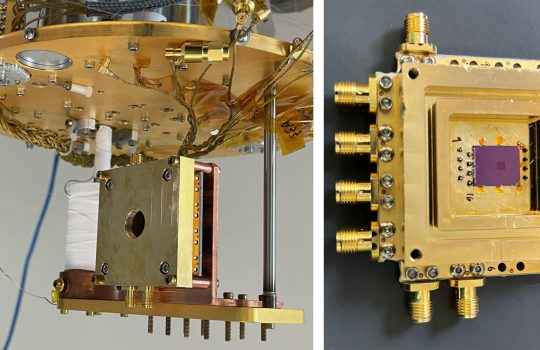When was the last time your laptop or cloud storage notified you that it was running low on space? Or you transferred a file only to find out that a bug in the system caused damage, and you could no longer access the information? Data storage, access, and connectivity are important aspects of life in our digital age.
Quantum science researchers and engineers also handle valuable information and must ensure that the information stored in quantum devices remains intact. Silvia Zorzetti, engineer at the Department of Energy’s Fermi National Accelerator Laboratory, is pursuing an innovative approach. Her research aims to help preserve quantum information by focusing on improvements to the way we transport it.
Zorzetti earned an Early Career Award from the Department of Energy for her research proposal. The award provides $2.5 million over the next five years to support her work and create opportunities for students and young researchers to join her.

Silvia Zorzetti
Quantum information is highly fragile and can be lost due to material and environmental disturbance. Researchers refer to this as decoherence. To extend the lifetime of quantum information, researchers at the Superconducting Quantum Materials and Systems Center at Fermilab employ superconducting radio-frequency devices and place the devices into ultra-cold refrigerators.
Zorzetti introduced a new perspective. She aims to figure out how to transmit quantum information out of the fridge without damaging it.
“This project aims to uncover new potentials in quantum information science, specifically by improving the transfer of quantum information from ultra-cold fridges onto fiber optics,” explained Zorzetti.
She emphasized that achieving the capability to transmit quantum information over significant distances holds implications for diverse scientific domains, including national security, quantum communication and network technologies.
“This research has the potential to advance the creation of the quantum internet, quantum networks featuring quantum processing units, and sensor networks,” she said.
Zorzetti is currently investigating microwave-optical transducers, tools that convert microwave photons into optical photons—tiny packets of light. She proposes to explore the use of superconducting cavities with long coherence time to enhance the conversion efficiency and employ fiber-optic cabling and optical photon counters to prevent information loss.

Fermilab engineer Silvia Zorzetti inspects an optical coupling device for her quantum information project. Photo: Dan Svoboda, Fermilab
Superconducting radiofrequency cavities are powerful tools for detecting dark matter and constructing scalable quantum computers. Researchers at the SQMS Center are at the forefront of research into these devices. Reading out the quantum information, however, poses a challenge. External electronics used to amplify the quantum information introduces noise and may lead to information loss. Microwave-optical transducers offer a solution by efficiently counting single photons in the optical region, where photon counting is more feasible.
“Optical readout has proven to be the most efficient method for many applications,” Zorzetti said. “The challenge lies in the conversion process. If we can efficiently convert microwave to optical photons at the quantum threshold, we preserve the information and enhance the overall efficiency compared to typical methods.” Through careful design and optimal engineering, it seems possible to improve the microwave-optical conversion efficiency up to 50%, a result still out of reach.
Zorzetti’s research will occur at the SQMS Center, one of five DOE quantum information science centers. SQMS’s hallmark is understanding the foundational materials used in quantum information science. Zorzetti’s award builds on this work and moves it forward. The proposed research will utilize and expand existing facilities, equipment, and infrastructure initiated with Fermilab’s Lab Directed R&D program.
“We are delighted to congratulate Silvia for earning the prestigious Early Career Award,” said Anna Grassellino, director of the SQMS Center. “Silvia’s exceptional leadership in research and workforce development within our center has been consistently noteworthy, and this award rightly recognizes her ongoing impact on both fronts. The SQMS Center eagerly anticipates the outcomes of Silvia’s innovative research, leveraging the state-of-the-art facilities and unique resources available at Fermilab.”
Zorzetti’s journey at Fermilab spans 12 years. She first joined the lab as a participant in the Italian Summer Student program in 2011. She joined the laboratory as an employee in 2017. In addition to the research she leads at SQMS, Zorzetti also serves as the Ecosystem and Workforce Development leader for the center.
Reflecting on her experience, Zorzetti said, “I worked at the lab for three summers as a student. I quickly realized that Fermilab was a unique environment that connected me to the work in new ways.”
The Superconducting Quantum Materials and Systems Center at Fermilab is supported by the DOE Office of Science.
The Superconducting Quantum Materials and Systems Center is one of the five U.S. Department of Energy National Quantum Information Science Research Centers. Led by Fermi National Accelerator Laboratory, SQMS is a collaboration of more than 30 partner institutions—national labs, academia and industry—working together to bring transformational advances in the field of quantum information science. The center leverages Fermilab’s expertise in building complex particle accelerators to engineer multiqubit quantum processor platforms based on state-of-the-art qubits and superconducting technologies. Working hand in hand with embedded industry partners, SQMS will build a quantum computer and new quantum sensors at Fermilab, which will open unprecedented computational opportunities. For more information, please visit sqmscenter.fnal.gov.
Fermilab is supported by the Office of Science of the U.S. Department of Energy. The Office of Science is the single largest supporter of basic research in the physical sciences in the United States and is working to address some of the most pressing challenges of our time. For more information, visit science.energy.gov.



